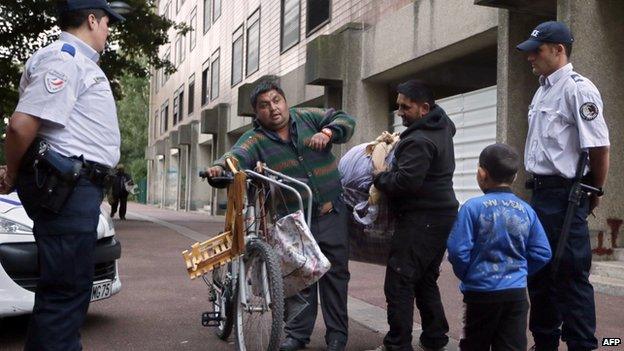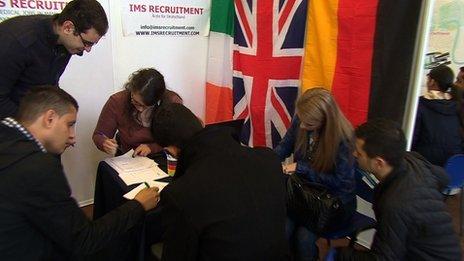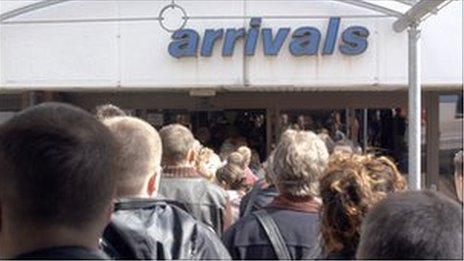Romanian and Bulgarian migration debate - views in Europe
- Published

There is an established community of Romanians working in Spain
Is the storm of British media coverage and political debate over an expected surge in immigration from Bulgaria and Romania replicated in other European countries?
On 1 January, Bulgarians and Romanians will have the same rights to work in the UK and all other EU countries as other EU citizens.
British media are predicting an influx of people from the EU's two poorest countries. The British government is tightening access to benefits for migrants.
But what has the reaction been in three other big European economies?

Spain - by Tom Burridge in Madrid
The British government has argued that Romanians, in particular, are more likely to move to Spain than Britain, because there is a large established Romanian community there and the languages are similar.
Some 869,000 Romanians make up the largest registered immigrant population in Spain - that's 16% of the total number of foreign nationals living in the country.
But in Spain, no-one seems to be concerned about the imminent lifting of working restrictions.
Even if you digest the Spanish press on a regular basis, you might have missed the fact altogether.
There is a potent, much-quoted statistic, which helps explain why Spain does not believe that, come 1 January, there will be an influx from the east.
Some 26% of people of working age in Spain are unemployed.
And that is largely why Spain now has negative net immigration, with more people leaving than arriving.
It is a dramatic turn-around from the period prior to 2008, during Spain's construction boom, when immigrants, principally from Latin America, poured in.
Last year, Spain's population fell for the first time since records began.
The other important thing to note is that since 2009, Spain has only had restrictions on Romanians coming to work, not Bulgarians.
And there are only 169,000 Bulgarians registered as living in Spain.
The fact is that Spain has not historically had the same levels of immigration as Britain - it is a relatively new phenomenon.
And, even with the astronomically high rate of unemployment, immigration is not the hot political topic that it is in the UK.

France - by Hugh Schofield in Paris

The position of the Roma has become a major political issue in France
In France - as in the UK - there is growing debate about freedom of movement for EU citizens, and the possible impact of the 1 January changes for Romanians and Bulgarians.
France in theory also faces the possibility of a big influx of workers - but the reality is not expected to be dramatic.
A year ago - as a preparatory measure - France extended the list of eligible jobs that Romanians and Bulgarians could apply for, but it did not trigger any significant rush.
No, in France the debate over Bulgarian and Romanian immigration is entirely subsumed - rightly or wrongly - by the much more poisonous debate over the Roma.
This is an extremely hot issue in advance of municipal elections in March. The left accuses the right of alarmism. The right accuses the left of naivety.
And meanwhile Interior Minister Manuel Valls has become by far the most popular member of the Socialist government by the simple mechanism of talking tough.
It was Mr Valls who pointed out recently that the number of Romanian citizens arrested in Paris went up from 1,300 in 2008 to 8,245 in 2011, before falling back slightly to 7,550 in 2012.
Everyone in Paris knows that there are gangs of Roma minors operating as pickpockets, bag-snatchers and scam artists. They come in every day from squalid encampments in the suburbs. Many shopping streets have Roma beggars sitting at regular intervals, outside bakeries, banks and supermarkets.
Everyone in a position of responsibility knows they have to tread extremely warily when discussing these findings. The far-right National Front is poised to exploit any sign of a link between immigrants and crime.

Germany - by Stephen Evans in Berlin
There are concerns in Germany about migration from poorer parts of the European Union to get the benefits of living in richer parts - like Germany.
The coalition agreement between the governing parties - Chancellor Angela Merkel's CDU and the Social Democrats - specifically mentions worries about "unjust claims for social security benefit".
And, last year, the home affairs minister said he was worried about the "consequences of European economic migration" and "the abuse of freedom of movement".
But the debate in Germany is nowhere near as prominent or as shrill as it is in Britain. No German politician anywhere near government is questioning the free movement of labour, which they see as fundamental to the very idea of the European Union. It is more about enforcing existing law than writing new law.
Some politicians on the right in Germany wonder if the British government's strong stance is being driven by British domestic politics and fear of the populism of the United Kingdom Independence Party (UKIP).
As Manfred Weber of the Christian Social Union (the Bavarian sister party of the CDU) put it to Der Spiegel: "Cameron should stop running after UKIP. He only strengthens UKIP with his rhetoric."
In Germany, any newcomer has to wait three months before being able to claim social benefits. Applicants are individually assessed and officials decide if the person has come to Germany just because it offers better benefits than back home.
Accordingly, virtually everybody from Spain, which has very high unemployment, is turned down. If a person in Germany can be shown to have been genuinely seeking work for some time, they will be eligible for benefits.
The one party, except those on the far-right, which campaigns avowedly for tighter control on immigration won little public support in the general election.
Germans, by and large, have worries about what they call "poverty migration" but that does not lead them to question one of the fundamental ideas of the European Union, which is that its citizens should be able to move freely between member countries.
- Published2 December 2013

- Published3 November 2014

- Published25 November 2013

- Published2 December 2013
